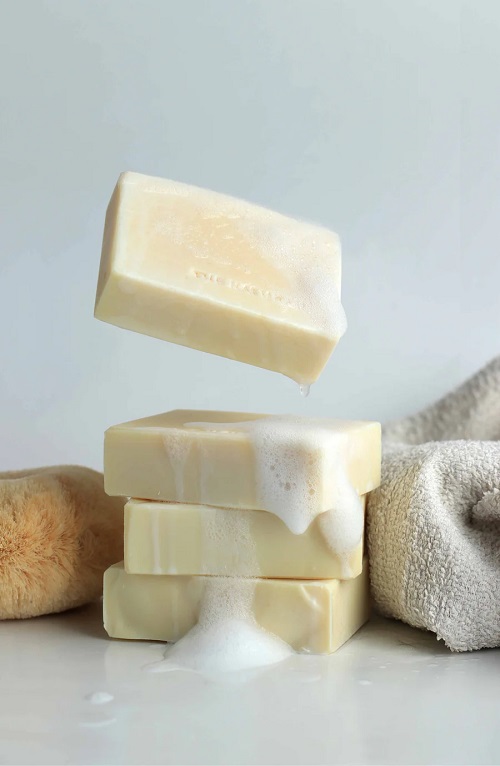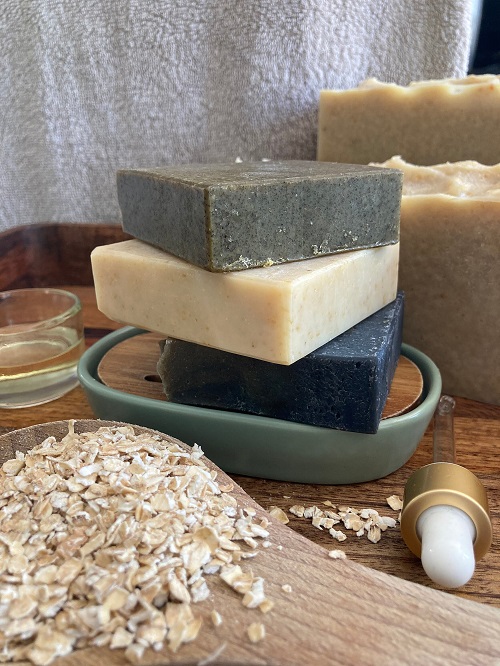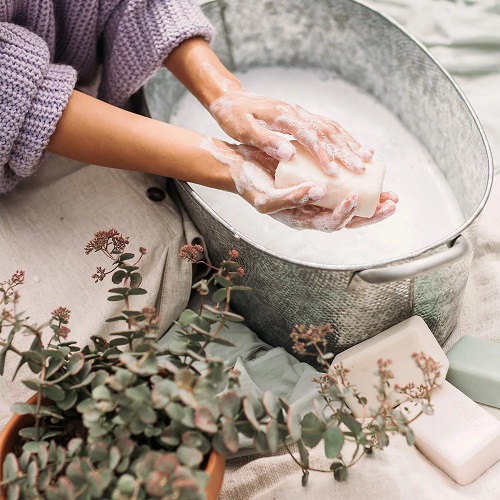Embrace a holistic approach to radiant skin and luscious hair with this informative guide on Castor Oil Soap!
Derived from the castor oil plant (Ricinus communis) seeds, castor oil has found its place in beauty rituals for centuries due to its remarkable medicinal and cosmetic properties. Harness its soothing benefits with this Castor Oil Soap Guide!
Learn about Castor Oil Soap Benefits for Hair and Skin here
What is Castor Oil Soap?
Castor oil soap is made by blending castor oil with other oils and an alkali, typically sodium hydroxide (lye). This interaction preserves many of the intrinsic benefits of castor oil while adding the cleaning and lathering attributes typically associated with soap.
Castor Oil Soap Benefits

The content of Castor Oil in Soap possesses superb nourishing properties such as:
- Moisturizing: Castor oil is a humectant, which means it attracts moisture to the skin. As a result, soaps containing castor oil can help keep the skin hydrated.
- Anti-inflammatory: Castor oil contains ricinoleic acid, an unsaturated fatty acid that has been shown to have anti-inflammatory properties. This may help soothe irritated or inflamed skin.
- Antimicrobial Properties: Studies indicate that castor oil has antimicrobial qualities, potentially helping in the reduction of certain bacteria and fungi on the skin.
- Promotes Wound Healing: Thanks to its moisturizing and anti-inflammatory properties, castor oil soap can promote faster wound healing and reduce scarring.
- Lather and Creaminess: With a rich fatty acid content, castor oil imparts a rich lather and creaminess to soaps, making them luxurious and pleasant to use.
How to Use Castor Oil for Soap Making?
The process of creating soap involves a reaction called saponification, wherein fats or oils are mixed with an alkali, commonly sodium hydroxide (lye). Follow these steps for successful Castor Oil Soap Making at home:
Ingredients:
Oils:
- Castor oil: 5 oz (This is about 20% of the total oils used, which is a common amount to give the beneficial properties of castor oil without making the soap too soft or sticky.)
- Olive oil: 10 oz (For a softer, moisturizing soap)
- Coconut oil: 10 oz (For hardness and lather)
Lye Solution:
- Sodium hydroxide (lye): 4.5 oz (Ensure you are using 100% pure sodium hydroxide)
- Water: 11 oz
Optional Additives:
- Essential oils: 0.5 to 1 oz for fragrance (e.g., lavender, tea tree, peppermint)
- Colorants or natural exfoliants like oatmeal, if desired
Procedure:
- Safety First: Always wear gloves, goggles, and protective clothing. Work in a well-ventilated area and keep vinegar on hand to neutralize any lye spills. Remember, lye is caustic and can cause burns.
- Prepare the Lye Solution: Slowly and carefully add the sodium hydroxide to the water, stirring until it dissolves. This will heat up and produce fumes, so avoid breathing them in. Let this solution cool down to around 100°F to 110°F.
- Melt the Oils: In a separate pot, combine the olive oil, coconut oil, and castor oil, and heat them until they’re completely melted. Allow the oils to cool to 100°F to 110°F.
- Combine and Mix: Once the lye solution and oils are around the same temperature, slowly pour the lye solution into the pot with the oils while stirring. Use a stick blender to mix the soap batter until it reaches “trace,” when the soap mixture has thickened enough to leave a trace when drizzled over itself.
- Add Extras: If you’re adding essential oils, colorants, or exfoliants, now is the time to mix them in.
- Mold: Pour the mixture into a soap mold. If you don’t have a soap mold, a silicone loaf pan or a cardboard box lined with parchment paper will work.
- Set: Cover the soap gently with plastic wrap, and set it in a cool, dry place to harden for 24 hours.
- Cut and Cure: After 24 hours, remove the soap from the mold and cut it into bars. Place these bars in a cool, dry place to cure for 4-6 weeks. This allows the saponification process to complete and the soap to harden, becoming milder over time.
Note: The quantities mentioned in the recipe are tailored for a small batch. Before making the soap, run your recipe through a soap calculator to verify the amount of lye needed. It will ensure that the saponification values are accurate for the safety and efficacy of the soap.
Uses of Castor Oil Soap
The uses of Castor Oil in Soap are many! Let’s explore them in detail:
- Skin Care: Castor oil soap is gentle enough to be used daily and is suitable for all skin types. It can help combat dry skin, reduce acne by balancing out oily skin, and soothe conditions like eczema or psoriasis.
- Hair and Scalp Care: Given its moisturizing benefits, the soap can be used as a nourishing shampoo bar, helping to hydrate the scalp and reduce dandruff.
- Makeup Removal: Its natural oils make it effective in breaking down makeup, ensuring a clean and hydrated face after washing.
- Shaving: The soap’s rich lather makes for a smooth shave, reducing the risk of nicks and cuts.
- Deterring Pest: Castor oil soap is an eco-friendly deterrent for certain garden pests. Its distinct aroma and taste repels moles, voles, and some insects, reducing the need for chemical pesticides and promoting a healthier garden environment.
Caution: While castor oil soap is generally safe for most people, it’s always a good idea to do a patch test if you’re trying it for the first time. If irritation occurs, discontinue use. Learn about its side effects here.
Key Takeaways
Castor oil soap, sourced from the Ricinus communis plant, has a long-standing history of diverse applications. Recognized both for its benefits in skincare and as a natural alternative in pest control, it offers a chemical-free approach for users.
When choosing castor oil soap, you’re not only opting for a traditional beauty solution but also supporting an environmentally responsible choice. Incorporating it into your daily routine can yield tangible benefits, minimizing reliance on synthetic products.
FAQs
1. Can I Use Castor Oil Soap for Sensitive Skin?
Castor oil soap’s gentle and soothing properties suit sensitive skin types. Its natural ingredients and lack of harsh chemicals ensure a mild cleansing experience without irritation.
2. Is Castor Oil Soap Suitable for Acne-Prone Skin?
Yes, castor oil’s antibacterial and anti-inflammatory properties can benefit acne-prone skin. The soap’s ability to cleanse and nourish the skin can help reduce breakouts and promote a clearer complexion.
3. Does Castor Oil Soap Help with Dandruff?
Yes, the nourishing properties of castor oil can help combat dandruff and alleviate scalp dryness. Regular use of castor oil soap as a shampoo can reduce flakiness and promote a balanced scalp.
4. How Long Does It Take to See Results with Castor Oil Soap for Skincare?
Results may vary depending on individual skin types and concerns. However, many users notice improved skin hydration and texture within a few weeks of regular use.
5. Can Castor Oil Soap Be Used on the Face and Body?
Castor oil soap is versatile abd potent for facial and body cleansing. It effectively cleanses without stripping the skin of its natural oils.
6. Does Castor Oil Soap Help Fade Scars and Stretch Marks?
While castor oil possesses scar-fading properties, its effectiveness may vary from person to person. Regular use of castor oil soap, coupled with proper skincare, may contribute to the gradual fading of scars and stretch marks.
7. Can Castor Oil Soap Be Used for Baby’s Skin?
Castor oil soap with gentle ingredients can suit a baby’s delicate skin. However, ensure that the soap does not contain any nut-derived oils or other allergens.
8. Can Castor Oil Soap Help with Pest Control in Gardens?
Yes, castor oil soap mixed with dish soap can act as a natural pest deterrent for moles, gophers, skunks, and voles. These pests dislike castor oil’s spicy aroma and taste, encouraging them to seek other habitats.
9. Can I Use Castor Oil Soap If I Have a Nut Allergy?
If you have a nut allergy, check the soap’s ingredients to ensure it contains no nut-derived oils. While castor oil is not a nut oil, it is always best to exercise caution and consult a healthcare professional if you have concerns.


